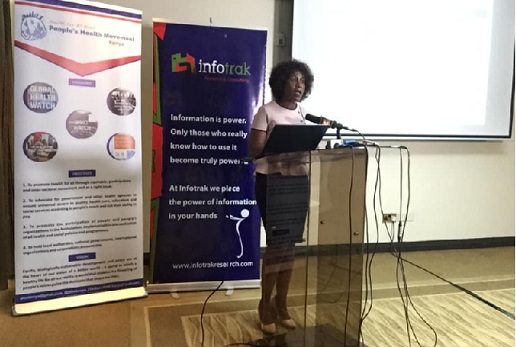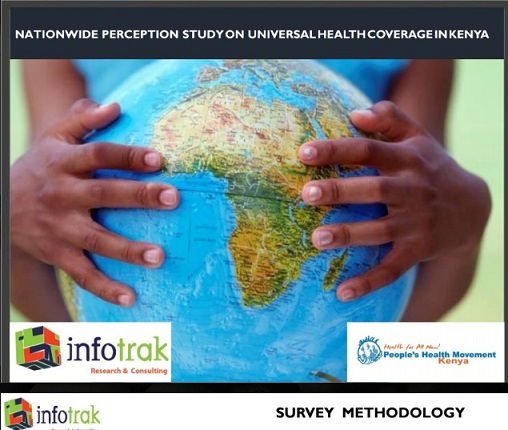Today, Infotrak Research & Consulting released their findings on public perception on Universal Healthcare Coverage (UHC) in Kenya.
The function was attended by community representatives, media and Civil Society Organizations (CSOs) working on issues of health.

The poll was conducted by Infotrak by using both telephone and face-to-face interviews with residents in the 4 UHC pilot counties (Nyeri, Machakos, Kisumu and Isiolo).
A total of 1,200 people were interviewed during the survey.
Below is an highlight of the findings from the survey:
-
Access to quality and affordable healthcare is among the top 10 key issues of concern that Kenyans believe should be addressed by both the National and County governments as a matter of priority. Others are unemployment, corruption and high cost of living.
-
Provision of healthcare services by the national and county governments was rated as poor by 40% of the respondents. Only 28% rated it as good.
-
A majority of Kenyans (61%) understand that provision of healthcare services is a devolved function and therefore a responsibility of county governments.
-
Up to 40% of Kenyans rated provision of healthcare services by both national and county governments as poor. Only 28% rated it as good;
-
A majority (54%) of Kenyan households spend up to KES 10,000 on healthcare services annually.
-
A majority of Kenyans (51%) do not have any form of medical insurance.
-
Of those who have medical cover, NHIF accounts for 89%.
-
A majority (64%) of Kenyans travel up to three kilometers to access the nearest public healthcare facility.
-
Public clinics/dispensaries were mentioned the most (at 42%) as the nearest public healthcare facilities.
-
Only four in ten Kenyans (43%) expressed their satisfaction with healthcare services received from public healthcare facilities.
-
A majority (54%) of Kenyan households spend up to KES 10,000 on healthcare services annually
-
A majority (64%) travel up to three kilometers to access the nearest healthcare facility
-
A majority (51%) of Kenyans do not have medical insurance cover. Only 49% of the respondents reported to have some form of medical insurance cover.
-
Only four in ten Kenyans (43%) expressed their satisfaction with healthcare services received from public healthcare facilities.
-
A majority (69%) of Kenyans are not aware of UHC. Only 31% reported to be aware of the UHC program. Awareness of UHC is highest in regions with a UHC pilot county.
-
There exists knowledge gaps/misconceptions on how UHC works. A majority (59%) believe with UHC, one can access healthcare services in any healthcare facility in the country. Another 52% believe with UHC, one has to be a member of NHIF to access healthcare services.
-
Awareness of UHC is highest in regions with a UHC pilot county.
-
Awareness of the UHC program is highest among those with post-secondary education
-
There exists knowledge gaps/misconceptions on how UHC works. A majority (59%) believe with UHC, one can access healthcare services in any healthcare facility in the country. Another 52% believe with UHC, one has to be a member of NHIF to access healthcare services.
-
An overwhelming majority (82%) rated UHC as an important program. Rating of UHC importance was lowest in Nairobi and Coast regions.
-
A majority would wish the UHC programme to cover both outpatient and inpatient services in both public and private healthcare facilities.
-
A majority (75%) expressed their likelihood to register for UHC in the future.
-
The costs involved (at 61%) was mentioned by a majority as their most determinant factor for UHC registration.
-
An overwhelming majority (82%) rated UHC as an important program. Rating of UHC importance was lowest in Nairobi and Coast regions.
-
A majority (75%) expressed their likelihood to register for UHC in the future.
-
The costs involved (at 61%) was mentioned by a majority as their most determinant factor for UHC registration.
UHC USAGE AND ATTITUDE
- Only about four in every ten Kenyans (42%) in the UHC pilot counties mentioned that they are registered for UHC. UHC registration is highest amongst the older age cohorts.
- Whereas 76% of the respondents have reportedly spent nothing while using UHC for treatment, some respondents reported having spent money on medical services while registered for UHC.
- A majority (73%) expressed their satisfaction with healthcare services received under the UHC programme mainly because of the free healthcare services.
- Dissatisfaction with the UHC programme is mainly driven by inadequate medicine (39%) and the duration it takes to receive service in healthcare facilities (37%).
- Whereas 76% of the respondents have reportedly spent nothing while using UHC for treatment, some respondents reported having spent money on medical services while registered for UHC.
- The main driving factor that made a majority (85%) of respondents to like UHC is the idea of FREE healthcare service. On the other hand, inadequate medicine (at 39%) and long queues (37%) are the major reasons for dislike of UHC.
Source: Infotrak Research & Consulting


